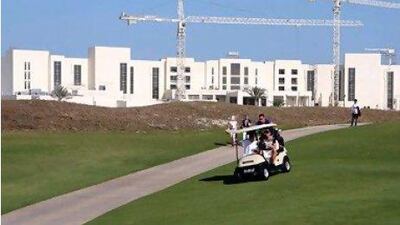The developer of Saadiyat Island is to delay several of the hotels it is planning to build there in an effort to make the multibillion-dollar project commercially viable, according to the company's chief executive.
"We're really rationalising the roll-out of our hotel developments," said James Pringle, the acting chief executive of TDIC.
"We were going to open bang, bang, bang, the Mandarin [Oriental], St Regis, a number of hotels. The original plan from two years or three years ago was just to build everything at once," he said.
There should eventually be a total of 29 hotels across the island, according to the master plan.
But now, opening several hotels at once "is a vision that we've modulated in line with the global market, in line with global economic realities, so I think TDIC today is much more commercially focused," said Mr Pringle.
"TDIC is funding most of our hotel development through commercial funding, and we have to be a commercial developer. And as we look at the roll-out of Saadiyat, there are commercial imperatives of doing that in a commercially responsible and sustainable way. It doesn't do the industry any good if you throw eight hotels into the market at once."
The Saadiyat development, costing more than US$25 billion (Dh91.82bn), will include branches of the Guggenheim and Louvre museums , and golf courses along with beaches and housing developments.
Nine hotels are planned for the beach district alone, some being developed by third-party developers. Abu Dhabi's hotel market has experienced declining profitability in the past two years, largely because of an increase in supply.
TDIC's initial aim was simply to build hotels to meet the requirements of Abu Dhabi's 2030 economic vision. The emirate is aiming eventually to quadruple the number of tourists it attracts to 7.9 million a year - close to Dubai's current visitor total.
In 2009, TDIC launched a $1bn bond and a $1bn sukuk.
TDIC is opening its luxury St Regis resort on the island in November, and a Dh1bn Park Hyatt hotel, being built by Abu Dhabi National Hotels, is expected to open a few weeks ahead of that property.
TDIC is keen for other hotels to open closer to the launch of the museums, expected by 2014, Mr Pringle said.
"The heart and soul, of course, is the museums, the cultural investment, and our retail development in what we call the Canal Precinct, which is the area linking the museums, is rolling out in sequence with the museums … We've made what I think is a realistic adjustment to sequence everything, from infrastructure to residential to lodgings, with the roll-out of the cultural district."
The entire Saadiyat Island development was originally projected to cost $27bn. But that value changes as construction costs fluctuate and slight design alterations are made.
The development timetables for hotels including the planned Mandarin Oriental "have all been extended out anywhere from 12 to 18 to 24 months", Mr Pringle said. "We're looking at phasing those, and we haven't set any finite dates for those yet."
The timetable for the completion of the Shangri-La, being built on Saadiyat Island by Al Jaber Group, was now largely down to the third-party developers, within broad dates set by TDIC, Mr Pringle said.
Analysts said the revised strategy seemed sensible.
"It is important for a destination such as Saadiyat Island that all components move in a planned and synchronised way," said Chiheb ben Mahmoud, the senior vice president for the Middle East and North Africa at the property consultancy Jones Lang LaSalle Hotels.
"It is a package, in the same way you cannot open a hotel without its planned spa and restaurants, you cannot have a resort destination without most of the components already there," Mr ben Mahmoud said. "Initiated and unfinished hotel constructions sites would hamper the successful emergence of the destination."
Elsewhere in Abu Dhabi, TDIC is aiming to open the Westin hotel at the Abu Dhabi Golf Club later this year, and the Anantara Eastern Mangroves resort in January.
"The hotels that we're opening … those are very differentiated products coming into the market," said Mr Pringle. "We're quite confident in the ability of those products to perform well in the market because of the demand those will generate on the business sectors and on tourism."

